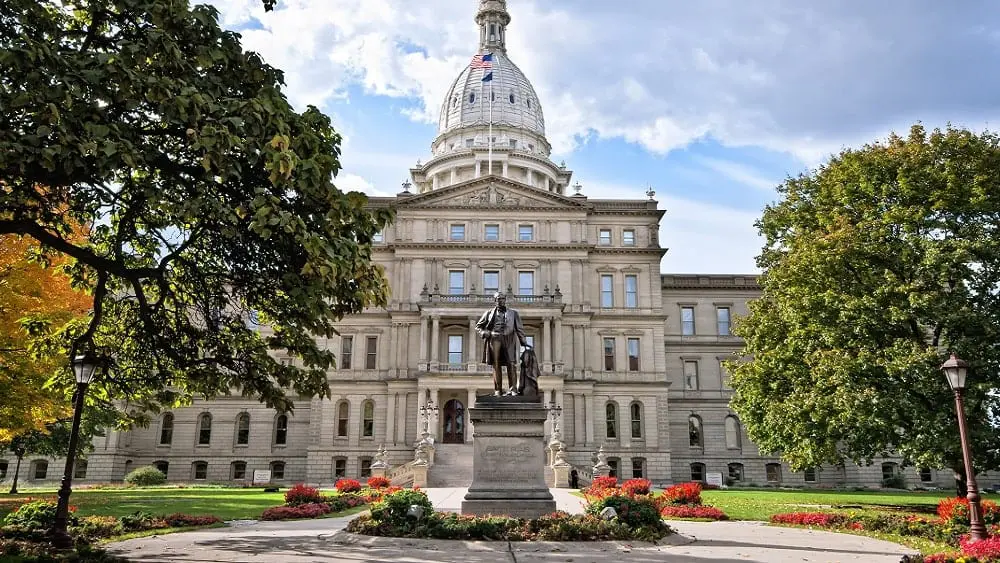
You’ve secured a competitive interest rate for a mortgage, saved for a down payment, and are ready to call Michigan home. But there’s one more expense to consider: closing costs.
While homebuyers focus on saving for a down payment, closing costs often fall to the wayside. In a nutshell, they encompass all the administrative and legal services you’ll need to pay for before you receive the keys to your new home, such as an appraisal, home inspection, purchasing home insurance, and paying property taxes. Closing costs can add up quickly, amounting to 2 percent to 5 percent of your home’s purchase price, paid alongside your down payment.
If you’re buying a new home in Michigan, NewHomeSource has put together the following guide on how much you should be saving for closing costs, a breakdown of what’s generally included, and how you can potentially lower these costs.
How Much Are Closing Costs in Michigan?
While Michigan has affordable housing and a lower cost of living compared to other parts of the country, it ranks 16th among the 50 states for average total closing costs at $2,844 for a home priced at $154,554, according to a 2021 report by ClosingCorp, which researches residential real estate data. That makes up 1.84% of the home price.
In comparison, the national average for closing costs for a single-family home was $6,087 in 2020. Homebuyers in New York spend an average of $8,256 on closing costs, some of the highest in the country, while in Missouri, closing costs estimates are low at $1,290.
Count on spending far more than these estimates, though. ClosingCorp’s data excludes two key costs: loan origination fees if you’re applying for a mortgage and private mortgage insurance, which you’ll need to buy if you have a down payment of less than 20 percent. Combined, these expenses could add up to thousands of dollars.
Home values have also crept up in the Great Lakes State: The average price for a single-family home was $243,062 as of September 2021, according to the Michigan Association of Realtors. If homebuyers should earmark 2 percent to 5 percent of their home’s purchase price on closing costs, estimates would be around $4,861 to $12,153.
Keep in mind, closing costs will fluctuate depending on the price of your home, its location, and the complexity of the sale.
What’s Typically Included in Michigan’s Closing Costs?
With so many moving parts, it’s easier to group closing costs into three categories: mortgage-related fees, property-related fees, and annual recurring fees. Each state also has its own set of regulations you’ll need to follow.
Here’s what to expect for Michigan:

Loan Origination Fees
Unless you’re buying a home with cash, your first stop in the homebuying process will be to a lender to apply for a mortgage. Your lender will charge loan origination fees to set up your application, from underwriting your loan to checking your credit history to processing your funding.
Loan origination fees are typically about 0.5 percent to 1 percent of your loan amount. With home prices averaging around $240,000, loan origination fees could be about $1,200 to $2,400, depending on the actual price tag.
Credit Report Fee
Before your lender decides you’re a responsible borrower, they’ll need to do a full credit check, which includes pulling your credit report to have a look at how you’ve managed your existing debts. Expect your lender to pass along this cost to you. If there is more than one borrower, double the cost.
Private Mortgage Insurance
If you aren’t providing at least a 20 percent down payment, your lender will expect you to buy private mortgage insurance, or PMI. It allows borrowers to qualify for a conventional loan even if they put down only 5 percent to 19.99 percent of their mortgage.
While you’re the one paying for the insurance, the coverage is for your lender. Since you haven’t put down 20 percent, PMI protects your lender in case of loan default.
PMI typically ranges from 0.25 percent to 2.25 percent of your balance, depending on the size of your down payment and credit score. Once you hit 20 percent equity in your home, you won’t have to worry about PMI payments.
Attorney Fees
While in some states it’s mandatory to hire a real estate attorney to help you with the entirety of your closing process, Michigan doesn’t have this requirement.
You may still decide to recruit a lawyer to help with all the legal aspects from drafting your purchase agreement to certifying deeds and reviewing contracts, title examinations, and home insurance policies.
Your real estate agent or title company may also recommend that you hire a lawyer if your home purchase is a complex one, such as if you’re buying from outside the state, the property has physical damage or it’s in foreclosure.
The price tag for hiring a real estate attorney in Michigan will vary, depending on where you are in the state and what you need your lawyer to do.
Escrow Fees
You may decide to hire a title company — or escrow agent — to help you with the closing process so that you get to closing day on time and without any hiccups. Your title company will act as a neutral third party, setting up an escrow account to hold your earnest money deposit, down payment, taxes, and other expenses. This way, the seller won’t receive any funds until both parties meet all their conditions on the sale and the contract is finalized. Your title company will also guide you through the checklist of things you need to complete by closing.

Michigan Real Estate Transfer Tax
High real estate transfer taxes are what drive up Michigan’s closing costs. Without taxes, ClosingCorp’s estimates peg the state’s average closing costs at $1,494 — more than $1,300 less than the total cost with taxes included.
The real estate transfer tax — also called a deed tax, mortgage registry, or stamp tax — is a typical charge each time property switches hands. The state’s transfer tax rate is $3.75 for every $500 of property value, while each county includes an additional transfer tax of $0.55 for every $500 too. If you move to a county with more than 2 million residents, the local transfer tax increases to $0.75 for every $500.
Title Search
Homebuyers need to pay for a title examination, which involves searching historical title documents to make sure the property is free and clear for you to own. During the search, deeds, court records, and property and name indexes are examined to confirm the property has no outstanding ownership disputes, unpaid taxes, judgments, or lawsuits in progress. The last thing you want is to buy property only to have your ownership in dispute. This is a crucial step your lender may insist on before issuing your mortgage, whether you’re buying a new build or an existing home.
Title Insurance
You’ll also need to buy title insurance for both you and your lender, via owner’s and lender’s title insurance policies. It’s one of several insurance policies — alongside homeowner’s insurance and PMI — that you’ll need to buy before your lender funds your home loan.
Title insurance covers you and your lender in case something is overlooked during the initial search. If your ownership is questioned, the insurance will cover court courts and related fees.
Appraisal
Another pivotal step in the homebuying process is the appraisal, in which your lender will send a third-party appraiser to the property to make sure the value is accurate. If you default on your mortgage and your lender forecloses, they need to know they can sell the property to recoup the cost of your loan. To determine your potential new home’s market value, the appraiser will look at the property’s specs, its size, and condition and how it stacks up to similarly priced homes in the neighborhood.
Your lender gets to choose the appraiser but you’re responsible for the bill.
Home Inspection
You’ll also need to hire a home inspector to check on the health and safety of your potential new home. They’ll examine everything from the foundation to the roof as well as the condition of your appliances and the plumbing and HVAC systems.
Listen to your home inspector’s feedback: They will point out any existing issues or problems that could surface in the coming years. This is important information because you can ask the seller to adjust the price to compensate for repairs you would need to make.
Price points for a home inspection will vary depending on the size of the property and where it’s located.
Annual Fees

Property Taxes
In Michigan, homeowners pay, on average, 1.44 percent of their home’s assessed market value in property taxes, according to the Tax Foundation, a decades-old tax policy nonprofit. The precise rate will vary depending on the taxes levied in the county you’re moving to.
Count on paying property taxes twice a year, each July and December.
Homeowner’s Insurance
Homeowner’s insurance is a mandatory purchase you’ll need to make before your lender transfers your mortgage funds. You must have it in effect and paid for the upcoming year before you move into your new home. Essentially, it covers you in case something happens to your property such as fire, vandalism, or theft.
Homebuyers in Michigan must determine whether they should add extended policies to their standard policy to cover natural disasters, like snowstorms or flooding, that aren’t covered in the standard policy.
Like property taxes, this is a prepaid expense, meaning it must be paid for in full at closing and can’t be rolled into the home financing.
Homeowners Association Fees
Nearly 20 percent of homeowners are members of a homeowners association in Michigan, so there’s a 1 in 5 chance you may be responsible for this annual fee.
HOA fees cover the cost of the various amenities provided by your neighborhood, such as clubhouses, pools, community parks, and fitness centers. They also are used to keep the community running with trash removal, security, and fire alarm systems. The more elaborate your HOA is, the more you should expect to pay.
Ask about HOA fees upfront when you’re shopping for a home so you know how much you’ll need to budget and what it includes.
How Can I Lower My Closing Costs in Michigan?

If you’re wondering how you’ll come up with the cash to close on your home, here’s a rundown of key strategies that could save you some money.
Closing Cost Assistance
Making use of homeownership assistance programs in Michigan is the most efficient way to cut down on your closing costs.
Start your research with the Michigan State Housing Development Authority, which provides mortgages with below-market interest rates. If you qualify for one of its home loan programs, you can apply for down payment and closing cost assistance of $7,500 or up to 4 percent of your home’s purchase price (whichever is less).
Look into regional programs, too. From Genesee County to Grand Rapids and Wayne County, there are plenty of local initiatives that provide funding specifically for closing costs.
Focus on Your Finances
Your aim is to secure a home loan with a low interest rate, which could save you thousands of dollars over the lifetime of your mortgage. To pull this off, you’ll need to show lenders you’re a low-risk borrower.
Stay on top of your existing loans, pay down your debts to keep your debt-to-income ratio low, and don’t apply for more credit before you make your case to lenders.
Save as much as you can, too. The closer you get to the 20 percent down payment threshold, the less you’ll have to pay in PMI.
Negotiate Loan Fees
There may be some wiggle room with the fees tied to setting up your home loan. If you have a longstanding relationship with your lender, you may be able to ask them to remove certain expenses from your final bill. Target fees that are labeled “junk fees,” such as rate lock fees, loan processing fees, and broker rebates.
You could also ask your lender to stagger these expenses, so they’re paid throughout the homebuying process in stages instead of at closing.
Seller Concessions
Negotiating price and compromising on who pays for what on closing costs are a routine part of the homebuying process. Don’t shy away from asking the seller to pay for some — or all — of your closing costs, especially if you’re in a buyer’s market.
You could also ask the seller to cover some of your closing costs if your inspector flagged issues that needed repairs. Or, if you’re purchasing a new build, talk with your builder about covering closing costs if you choose to pay a premium for certain upgrades. You could even submit a full price offer with a caveat that the seller pays the entire closing cost tab.
Ultimately, there are a handful of different scenarios where you could ask the seller to share the expenses.
Adding Closing Costs to Your Home Financing
If you can’t come up with the cash for closing costs, you may want to opt to roll this expense into your home loan. This way, you don’t have to pay for your closing costs on closing day, but the total will be added to your monthly mortgage payments.
While this is a convenient alternative to paying for closing costs upfront, you will end up paying interest on your closing costs across the life of your loan.
No-Closing-Cost Mortgages
Another solution you may be able to pitch to your lender is a “no-closing-cost” mortgage. In this scenario, your lender agrees to pay for part — or all — of your closing costs. In turn, you pay a higher interest rate on your mortgage.
Run some calculations before you decide if this is the best route to take. In the long run, this option could cost you more money because of the bump in your interest rate.
Other Michigan Resources

Carmen Chai is an award-winning Canadian journalist who has lived and reported from major cities such as Vancouver, Toronto, London and Paris. For NewHomeSource, Carmen covers a variety of topics, including insurance, mortgages, and more.
 10 Most Affordable Cities in Florida
10 Most Affordable Cities in Florida